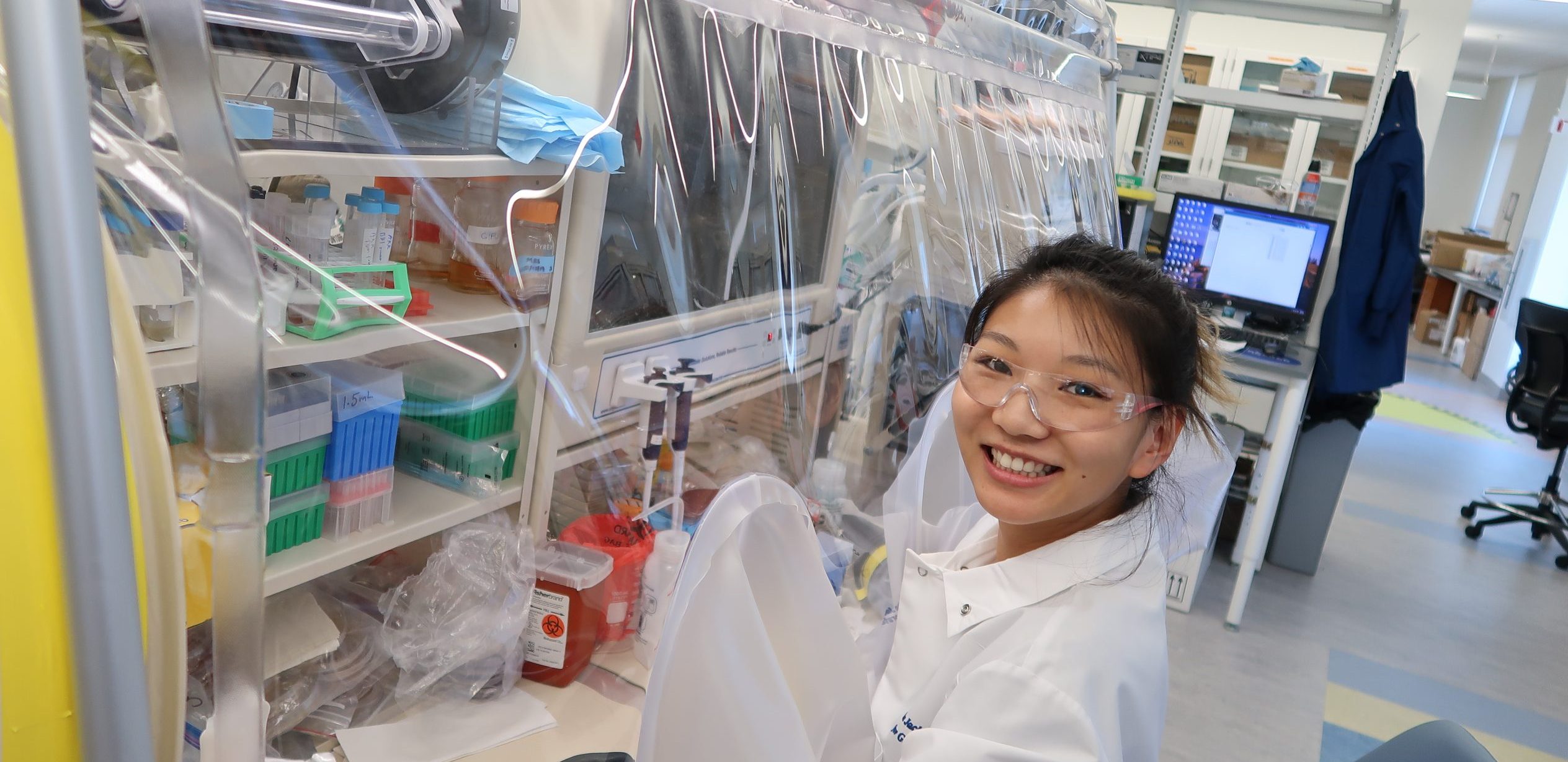
UConn’s M.D./Ph.D. program provides students with an intellectually stimulating and highly integrated educational experience leading to completion of both the M.D. and Ph.D. degrees. With many alumni matched to highly competitive residencies, the UConn M.D./Ph.D. program prepares its graduates for successful careers in both medicine and science.
Mission
The mission of our M.D./Ph.D. program is to prepare individuals of outstanding potential for productive careers as physician-scientists. The program emphasizes the development of skills necessary to become a highly competent and caring physician and to perform, evaluate, and communicate the results of independent research in the biomedical sciences.
Furthermore, we strongly believe in the importance of diversity, equity, and inclusion in science and medicine. Essential to this is our giving opportunities for students of all backgrounds including underrepresented minority groups, disadvantaged backgrounds, and those with disabilities. We are committed to provide individualized support for students from underrepresented or underprivileged backgrounds.
Our program is dedicated to high quality medical and graduate education tailored to the needs of the individual student. We are a close-knit community of students, faculty, and staff. Collegiality and mentorship are key aspects of the program.
Dedication to Diversity
The M.D./Ph.D. program at UConn Health is fully dedicated to making an environment that is inclusive and accepting of all of our students. To this end, we value diversity in all its forms, and encourage people of all backgrounds to apply to join our community of learning.
We believe that having a wide range of lived experiences adds value to the discussions we have with one another. As future healthcare providers and researchers, understanding differences in lifestyles and cultures help us provide the best care for our patients. The program works towards having a diverse environment to encourage dialogue and strengthen our understanding. Through this, we aim to add diverse and culturally competent physician-scientists to the work force.
We also emphasize outreach to underrepresented communities in our surrounding area through a variety of programs. These programs provide mentorship and education about the career paths in science and medicine, including physician-scientists. Through these, we aim to spread awareness and encourage diversity in the science and medical field in the future.
We welcome you to explore the many ways in which the UConn M.D./Ph.D. program, the School of Medicine, and the Graduate School work to ensure that UConn is a safe and welcoming environment for all. We also ask you to reach out to us with any questions about the M.D./Ph.D. program’s commitment to diversity, equity, and inclusion.
Program Structure
M.D./Ph.D. students matriculate for the first 18 months with the regular M.D. students before they pursue their graduate studies, taking four years to complete their Ph.D., and then return for clinical clerkships. During the first two years, in addition to completing the preclinical requirements of the medical school curriculum, students pursue select graduate school coursework and two to three laboratory rotations. Incoming M.D./Ph.D. students have the option to complete their first laboratory rotation the summer before matriculation.

There is an emphasis in continuity of clinical education, providing opportunity to practice clinical skills on patients from the start of medical school and throughout the graduate phase, better preparing students to excel in clinical rotations. Students remain actively involved in the program during all phases of their training via weekly research club, symposiums, leadership opportunities, and other events.
As part of the longitudinal clinical experience, students are required to continue clinical activities in community service clinics or in specialty clinics for a half day per month during the graduate phase in order to maintain their clinical skills. Following successful completion of requirements for the Ph.D. degree, students return to medical school to complete two years of clinical training.
For a full breakdown of program structure, see our page on the M Delta Curriculum for M.D./Ph.D. Students.
Medical Education
UConn School of Medicine is one of the nation's leading public medical schools, featuring a modern, case-based learning curriculum, early clinical experience, and state-of-the-art facilities for clinical simulation, virtual and cadaverial anatomy education
M.D./Ph.D. students engage in UConn School of Medicine’s industry-leading M Delta curriculum.
Learn more about UConn School of Medicine’s curriculum.
Graduate Education
During the graduate phase, students pursue intensive thesis research in one of seven areas of concentration (AOC) in biomedical science and complete additional coursework required by their AOC. The Biomedical Science AOCs are:
- Cell Biology
- Genetics & Developmental Biology
- Immunology
- Molecular Biology and Biochemistry
- Neuroscience
- Skeletal Biology and Regeneration
- Systems Biology
The Jackson Laboratory for Genomic Medicine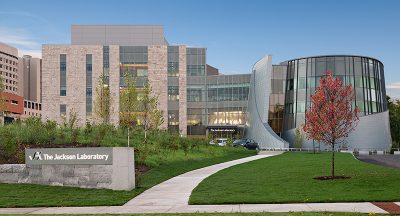
The Jackson Laboratory (JAX) offers collaborative research training opportunities for our students in mammalian genetics and genomic medicine on our UConn Health campus. Our students have the option to complete lab rotations and perform their Ph.D. thesis research with a JAX faculty member at the Jackson Laboratory on our Farmington, CT campus at UConn Health, if the JAX faculty member has an appointment as a faculty member of the UConn Graduate School. Learn more about the cooperative Ph.D. program and JAX-GM.
Facilities
Students
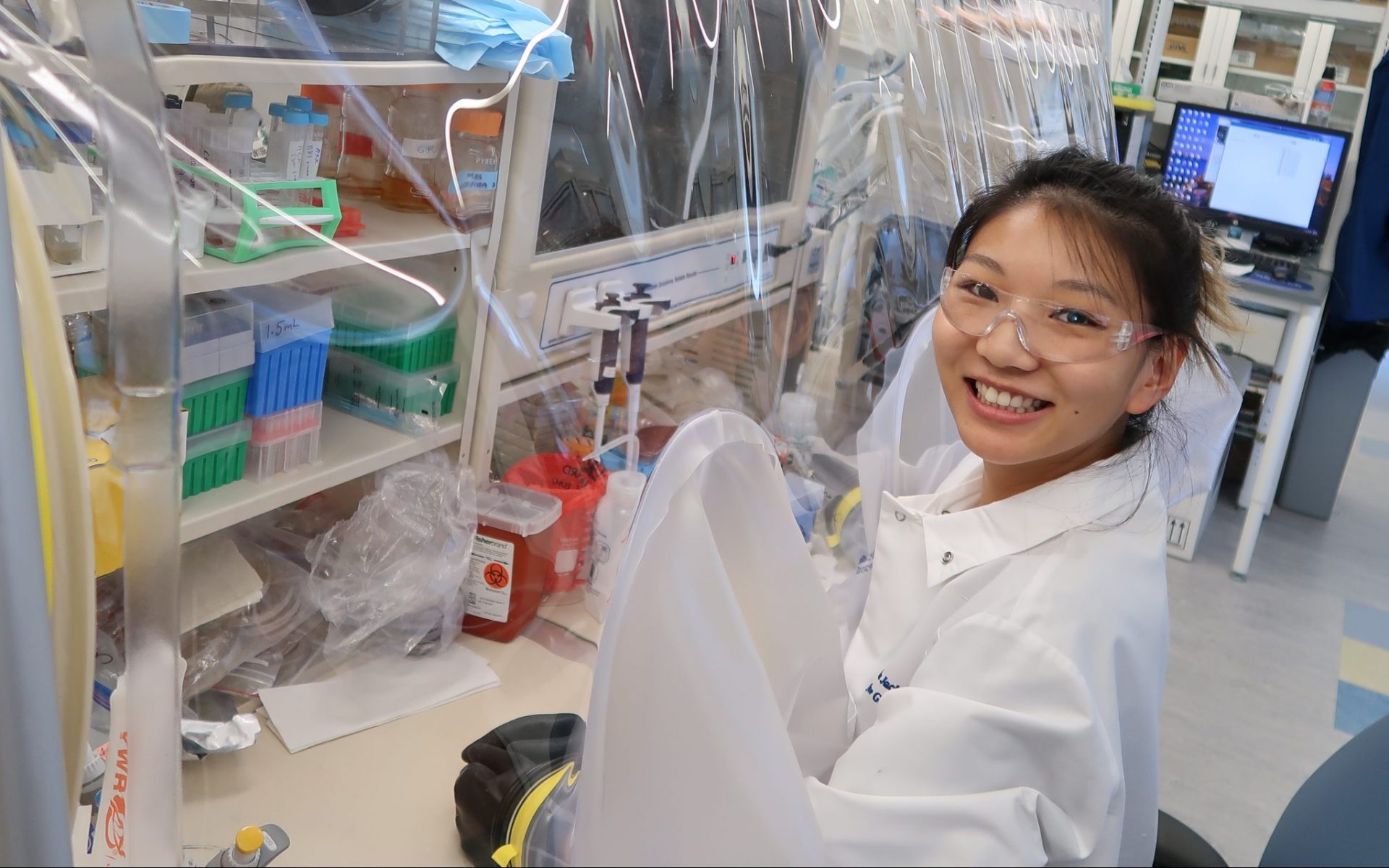 MD/PhD Candidate Jennifer Chung working in an anaerobic chamber.
MD/PhD Candidate Jennifer Chung working in an anaerobic chamber. Left to Right: MD/PhD Candidates Victor Wang (GS3), Grace Kwon (GS4), and Michael Chung (GS4).
Left to Right: MD/PhD Candidates Victor Wang (GS3), Grace Kwon (GS4), and Michael Chung (GS4).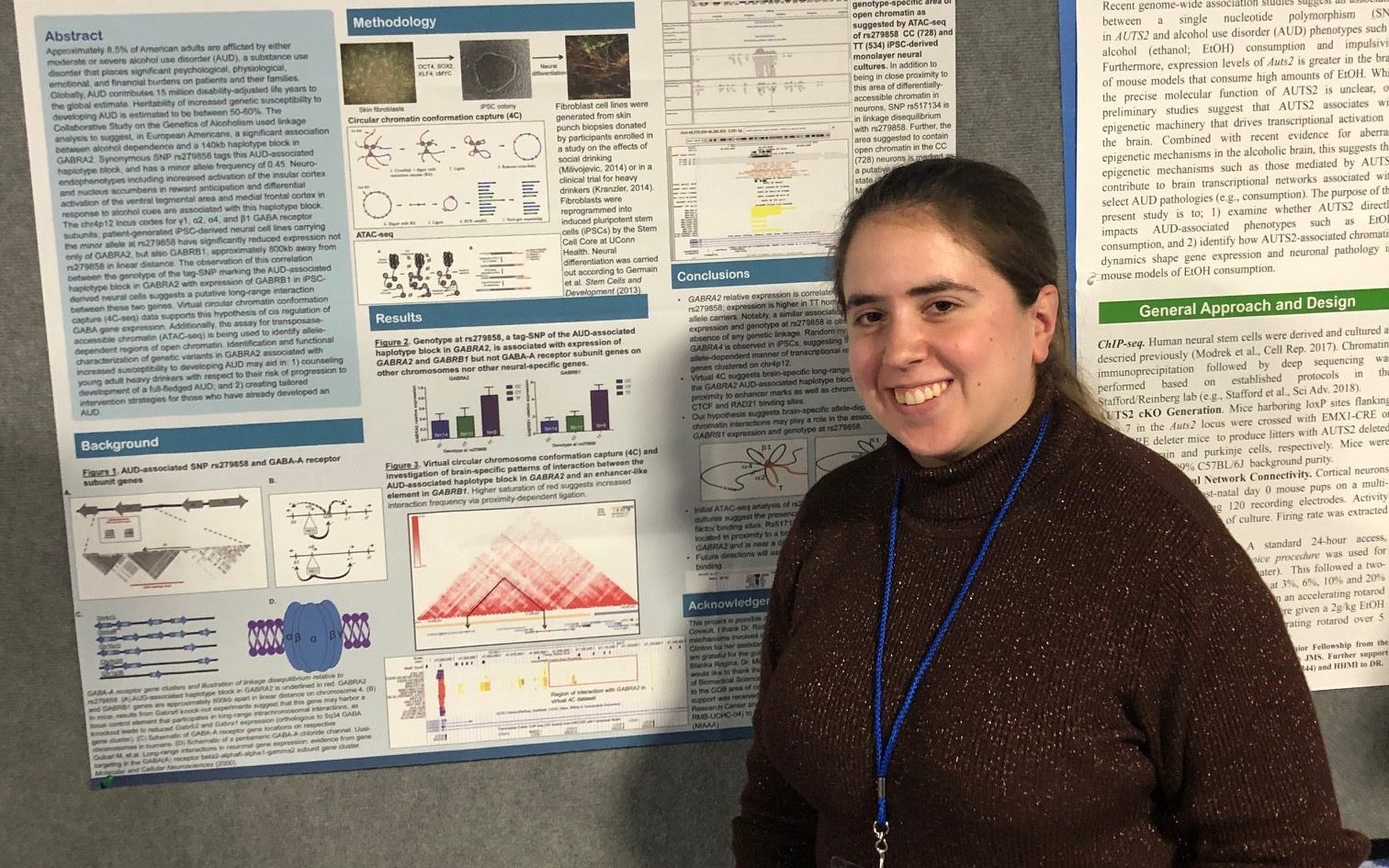 7th Year MD/PhD Student Alexandra Goetjen, M.S. presenting her ongoing thesis work in the lab of Jonathan Covault, MD PhD
7th Year MD/PhD Student Alexandra Goetjen, M.S. presenting her ongoing thesis work in the lab of Jonathan Covault, MD PhD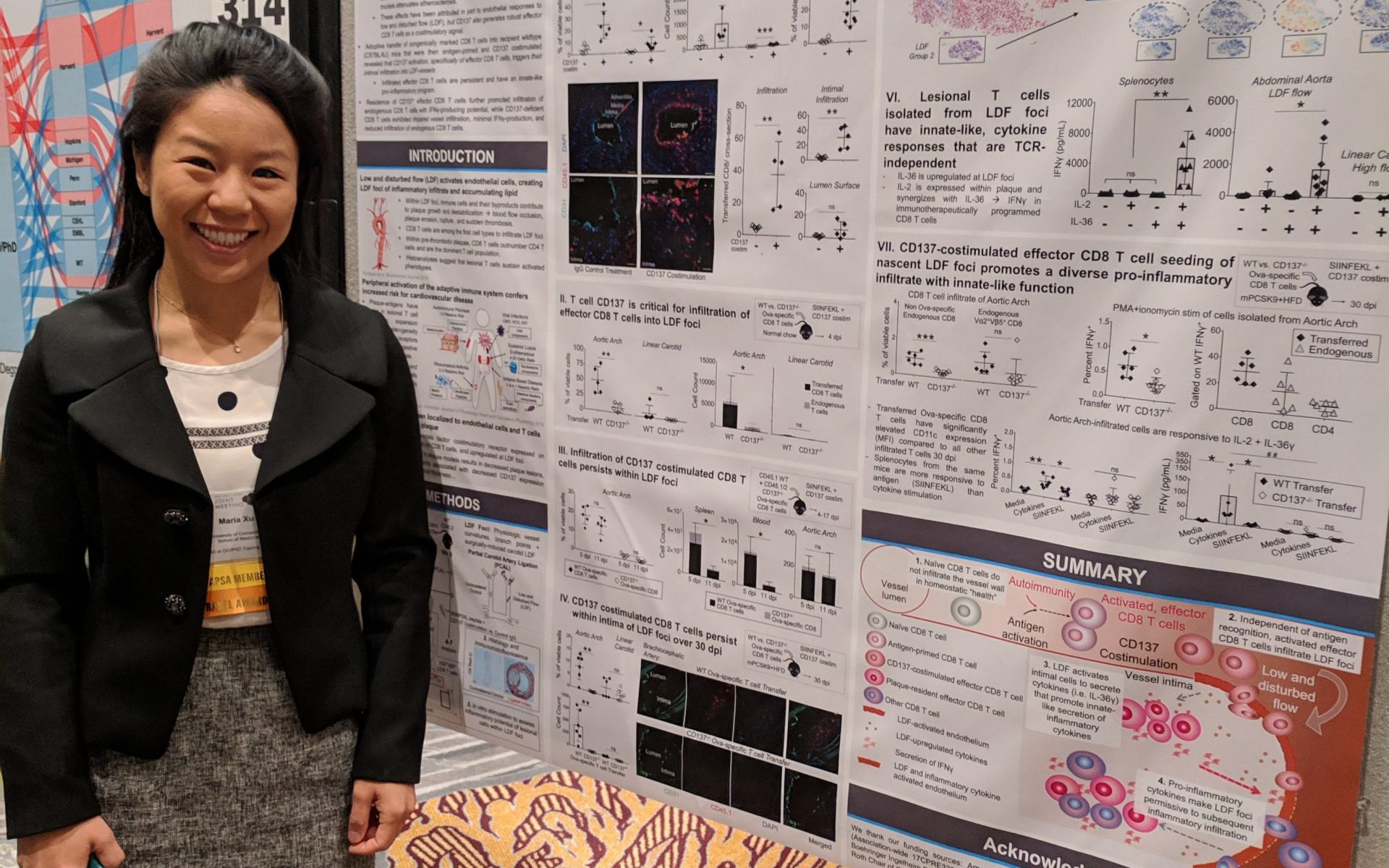 UConn MD/PhD Student Maria Xu presenting her ongoing research in the laboratory of Anthony Vella.
UConn MD/PhD Student Maria Xu presenting her ongoing research in the laboratory of Anthony Vella.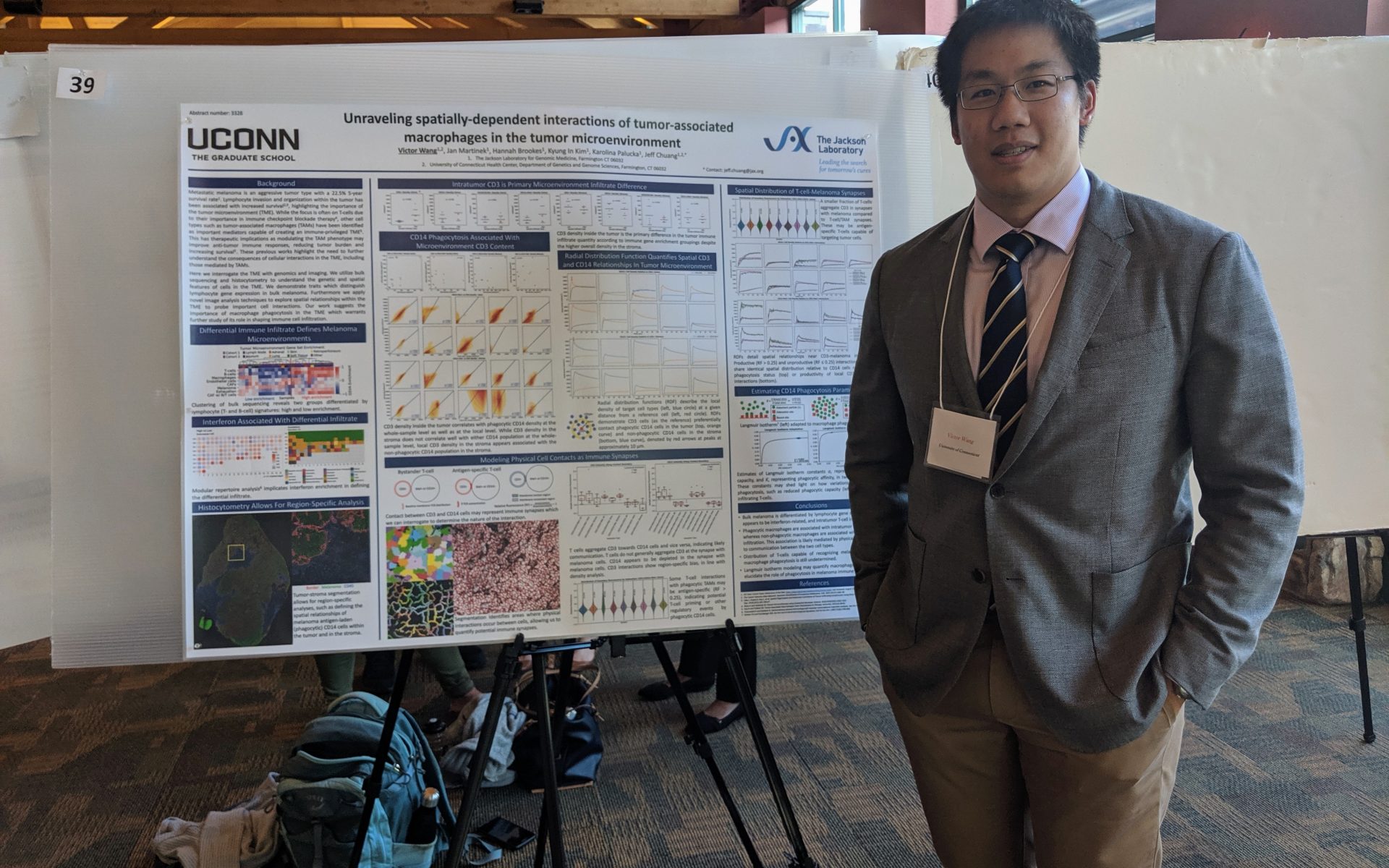 5th year MD/PhD Candidate Victor Wang presenting his research.
5th year MD/PhD Candidate Victor Wang presenting his research.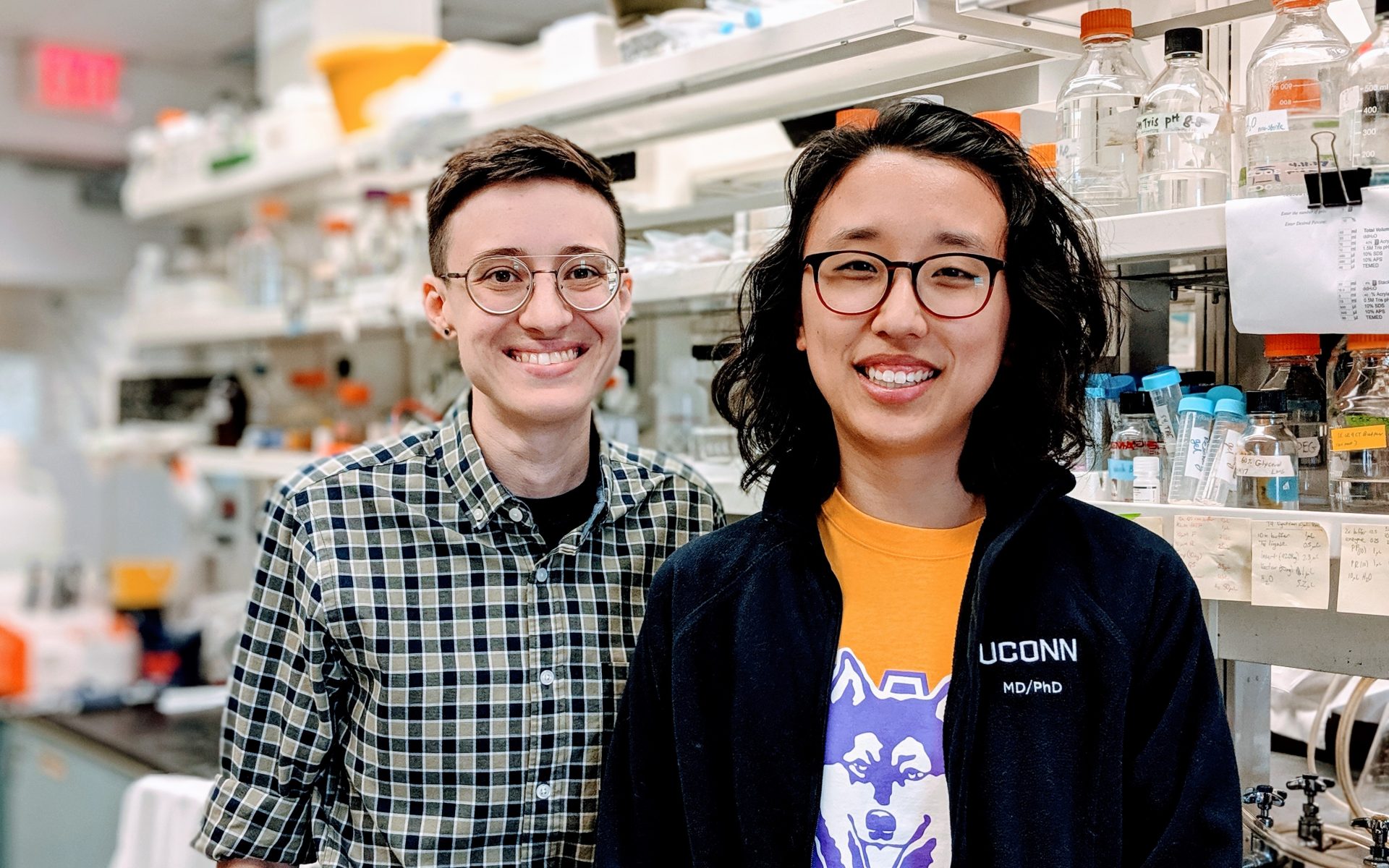 6th year MD/PhD Candidates Katie Discipio (Left) and Grace Kwon (Right) in their natural habitat.
6th year MD/PhD Candidates Katie Discipio (Left) and Grace Kwon (Right) in their natural habitat.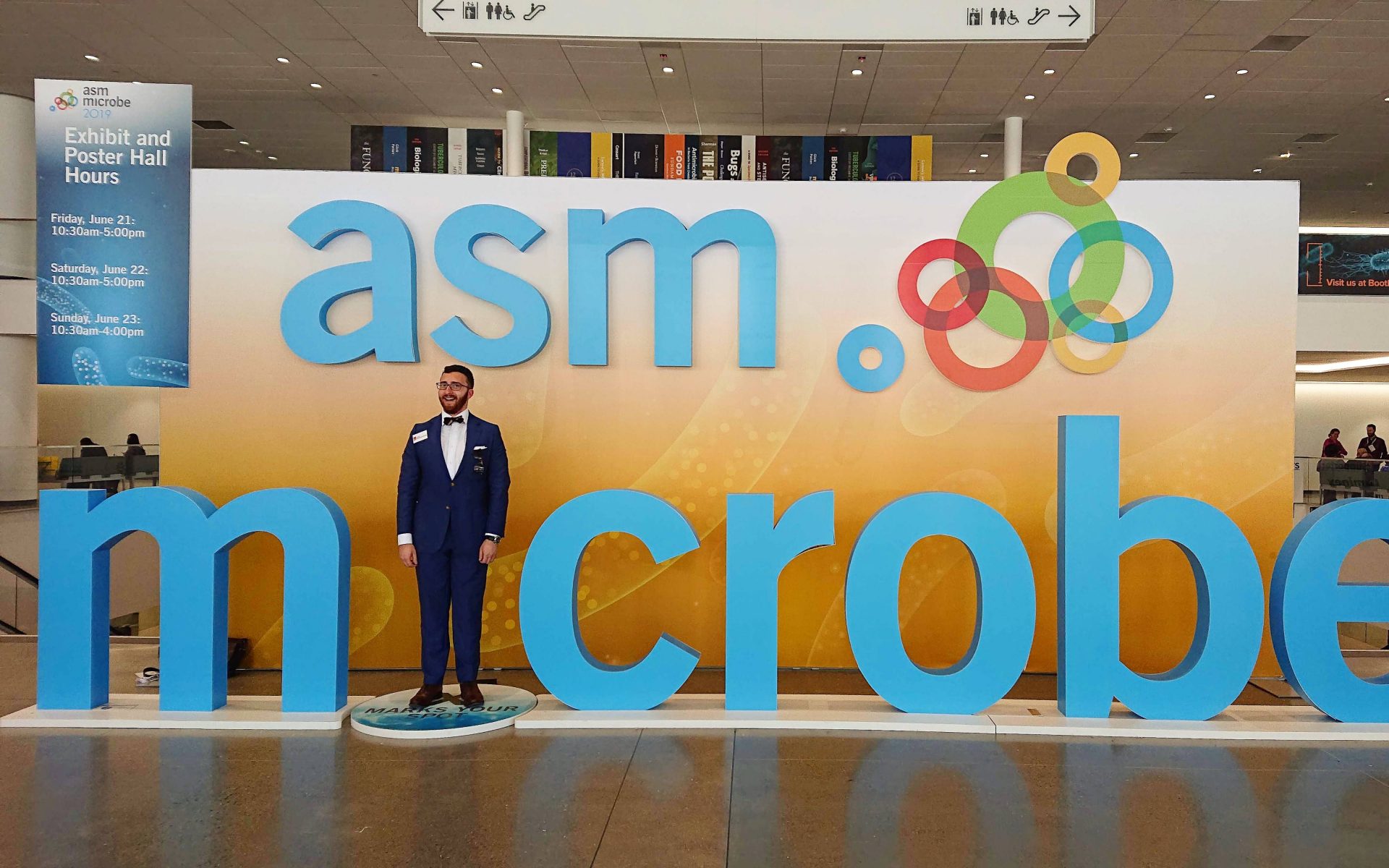 Peter Larson at ASM Microbe 2019
Peter Larson at ASM Microbe 2019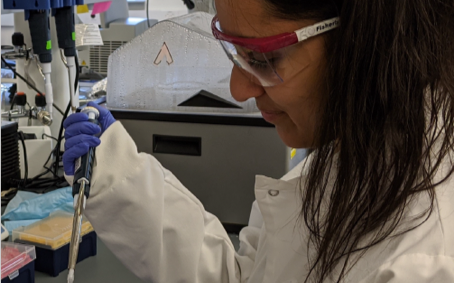 Feria Ladha (MD/PhD G3) conducting her PhD research in cardiology at JAX-GM.
Feria Ladha (MD/PhD G3) conducting her PhD research in cardiology at JAX-GM.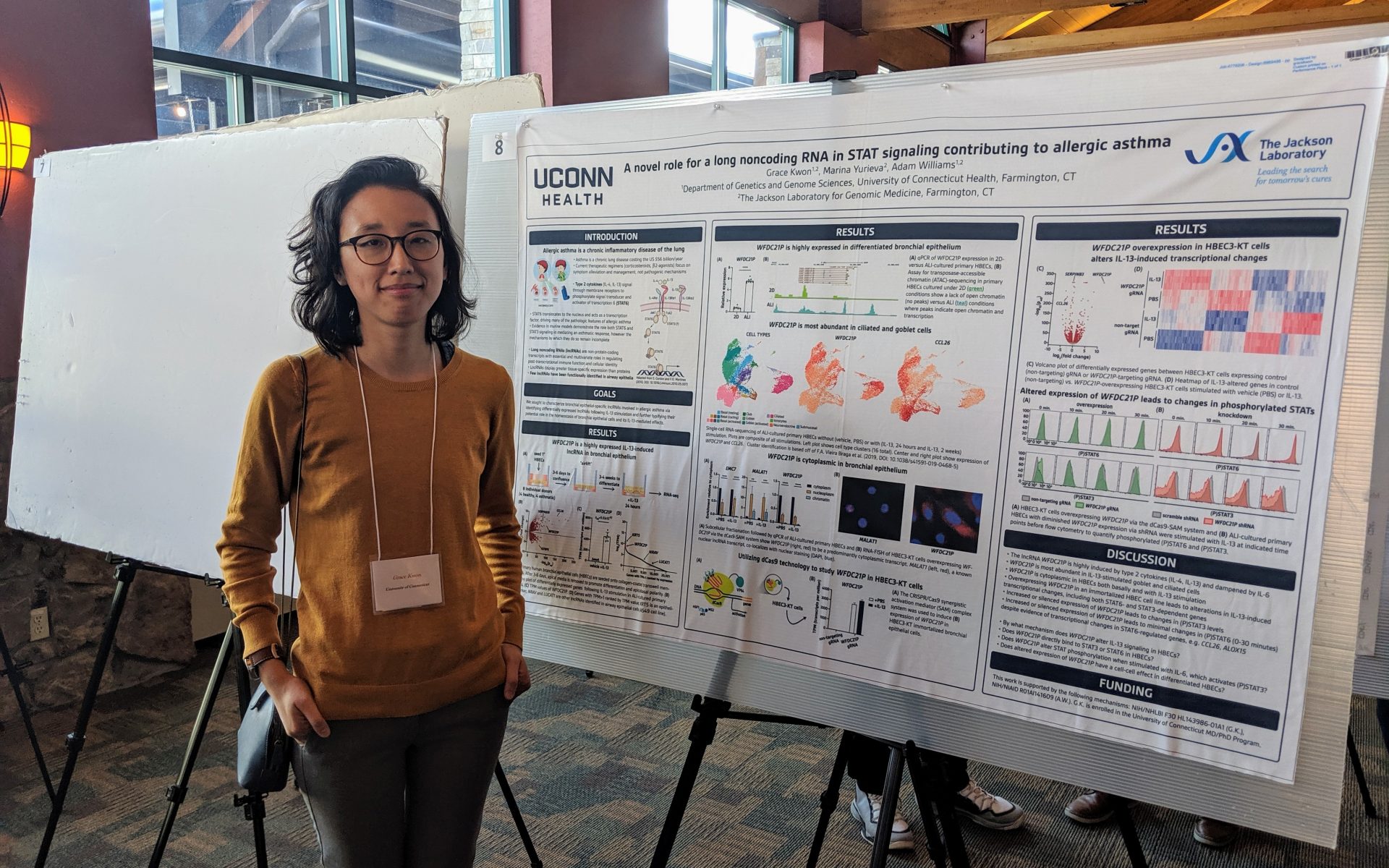 6th year MD/PhD Candidate Grace Kwon Presenting per research on long noncoding RNAs in asthma.
6th year MD/PhD Candidate Grace Kwon Presenting per research on long noncoding RNAs in asthma. UConn MD/PhD Student Maria Xu presenting her ongoing research in the laboratory of Anthony Vella.
UConn MD/PhD Student Maria Xu presenting her ongoing research in the laboratory of Anthony Vella. Albert Yu Kayaking at Keystone
Albert Yu Kayaking at Keystone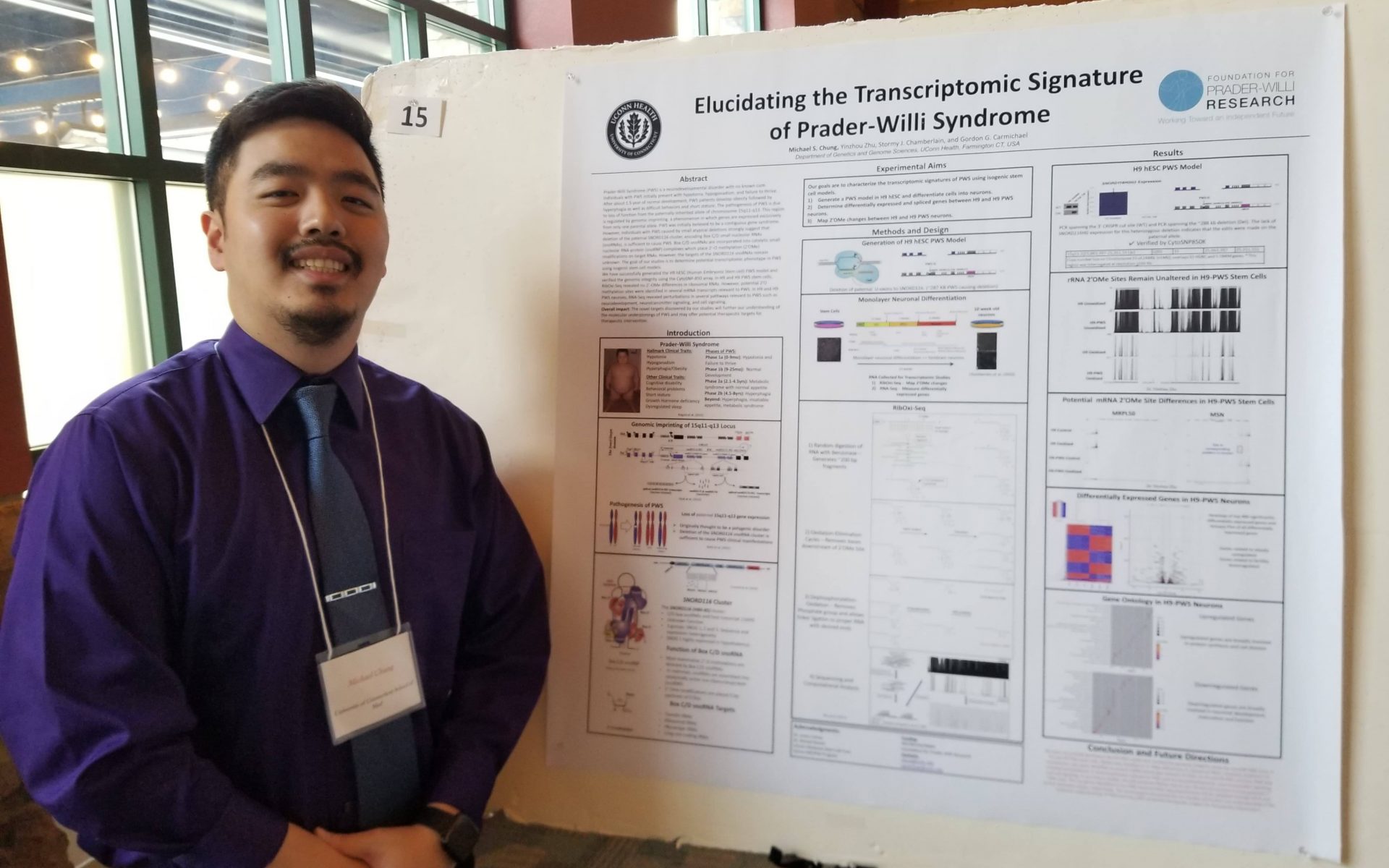 6th year MD/PhD Candidate Michael Chung presenting his research on Prader-Willi Syndrome
6th year MD/PhD Candidate Michael Chung presenting his research on Prader-Willi Syndrome UConn MD/PhD Students with Dr. Andrew Arnold at the American Society for Clinical Investigation (ASCI) Dinner. Left-right) Maria Xu (GS2), Feria Ladha (GS3), Peter Larson (GS2), Victor Wang (GS2), Dr. Arnold, Katie Discipio (GS3), Grace Kwon (GS3), and Anthony Pettinato (GS2)
UConn MD/PhD Students with Dr. Andrew Arnold at the American Society for Clinical Investigation (ASCI) Dinner. Left-right) Maria Xu (GS2), Feria Ladha (GS3), Peter Larson (GS2), Victor Wang (GS2), Dr. Arnold, Katie Discipio (GS3), Grace Kwon (GS3), and Anthony Pettinato (GS2)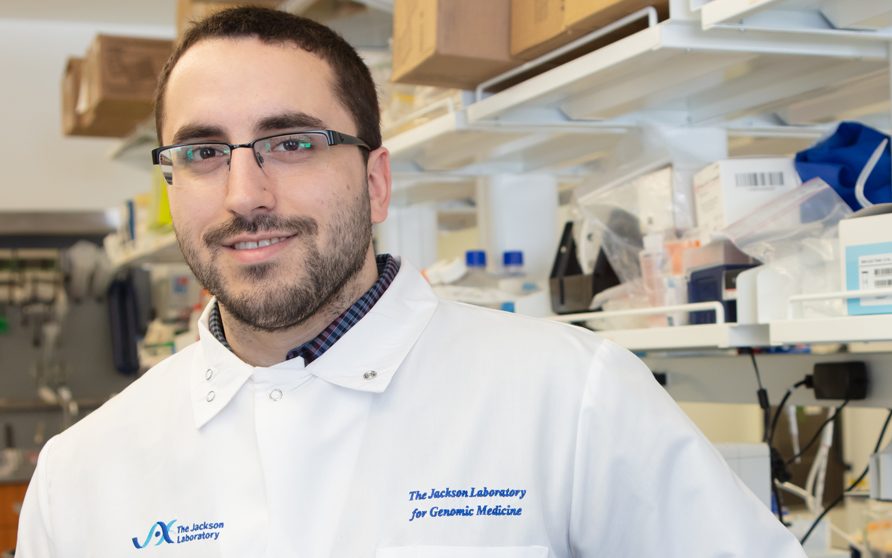 MD/PhD Candidate Anthony "Tony" Pettinato in the Hinson lab at Jax-GM.
MD/PhD Candidate Anthony "Tony" Pettinato in the Hinson lab at Jax-GM.
External Fellowship Awards
Although a tuition waiver and full stipend funding are guaranteed through the entire length of our program, most of our students succeed in obtaining fellowship grants such as NIH F30 and American Heart Association awards. We provide extensive support for trainee grant applications including a mock study section with senior faculty members to prepare our students for success. To read about some of our current student fellowships success stories, read our M.D./Ph.D. student blog.
Residency Placement
Our students routinely match to physician-scientist training programs (PSTPs) and other competitive residencies in a broad range of specialties all over the country. For more details, check out our M.D./Ph.D. Program fact sheet and M.D./Ph.D. student blog.
To learn more about the success of our our past and current students, see our M.D./Ph.D. student blog, Student Profile page, and M.D./Ph.D. Program fact sheet.
Applications
Applicants should have substantive research experience, a strong academic record, and prior clinical exposures. Applicants must complete the online AMCAS application, indicate on their application that they are applying to the UConn M.D./Ph.D. program, and complete the M.D./Ph.D. essay. Learn more about applying to the UConn PhD Program.
Contact Information
| M.D./Ph.D. Program Director Kim Dodge-Kafka, Ph.D. Email: dodge@uchc.edu M.D./Ph.D. Program Co-Director M.D./Ph.D. Program Co-Director M.D./Ph.D. Executive Committee Chair |
Program Administrators Ms. Tracy Dieli Email: dieli@uchc.edu Ms. Diane Starosciak Mailing Address |